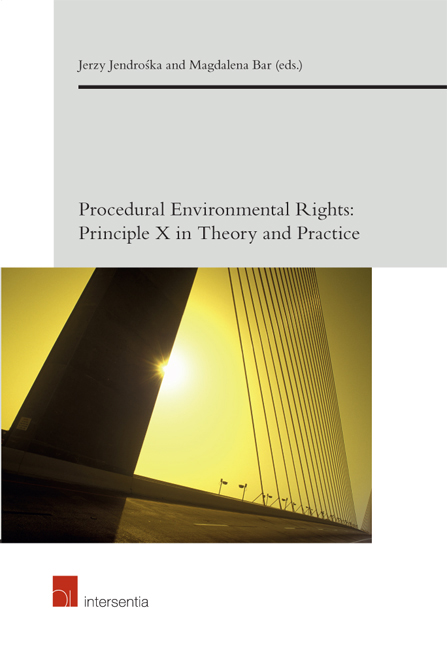Book contents
- Frontmatter
- Contents
- Introduction Procedural Environmental Rights in Theory and Practice
- Procedural Environmental Rights: Status and Developments
- Procedural Environmental Rights in Practice
- Public Participation
- Access to Justice
- Procedural Environmental Rights and Nature Protection
- Towards a Legally Enforceable Duty to Restore Endangered Species under EU Nature Conservation Law – On Wild Hamsters, the Rule of Law and Species Extinction
- Recognition of Rights of Nature, as a Subject of Law, in the International Environmental Law Framework
- Strengthening Conservation through Participation: Procedural Environmental Rights of Local Communities in Transboundary Protected Areas
- Procedural Environmental Rights and EIA
- Procedural Environmental Rights and Climate Change
Strengthening Conservation through Participation: Procedural Environmental Rights of Local Communities in Transboundary Protected Areas
from Procedural Environmental Rights and Nature Protection
Published online by Cambridge University Press: 12 October 2018
- Frontmatter
- Contents
- Introduction Procedural Environmental Rights in Theory and Practice
- Procedural Environmental Rights: Status and Developments
- Procedural Environmental Rights in Practice
- Public Participation
- Access to Justice
- Procedural Environmental Rights and Nature Protection
- Towards a Legally Enforceable Duty to Restore Endangered Species under EU Nature Conservation Law – On Wild Hamsters, the Rule of Law and Species Extinction
- Recognition of Rights of Nature, as a Subject of Law, in the International Environmental Law Framework
- Strengthening Conservation through Participation: Procedural Environmental Rights of Local Communities in Transboundary Protected Areas
- Procedural Environmental Rights and EIA
- Procedural Environmental Rights and Climate Change
Summary
ABSTRACT
Procedural environmental rights can be applied across state borders by way of the non-discrimination principle. This ‘transboundary’ or ‘extraterritorial’ dimension is first explored in the framework of regional organisations, such as the European Union and the Southern African Development Community (SADC), that can facilitate the emergence of higher participatory standards and, based on those standards, foster legislative harmonisation among the member states. The regional framework influences the dynamics of interstate cooperation in all fields, including for the conservation of shared natural resources. In the context of cross-border conservation initiatives, like transboundary protected areas (TBPAs), the extraterritorial application of procedural environmental rights can strengthen public participation of local communities. These communities are entitled to procedural environmental rights as ‘public concerned’ towards all partner countries since the creation of a TBPA can impinge on their survival and livelihoods. Indeed, local communities have a primary role in the sustainable management of natural resources, and their participation is crucial for the longterm success of cross-border conservation. Transfrontier Conservation Areas (TFCAs) have been established to frame cross-border conservation efforts in the SADC region; therefore, the Kavango Zambezi Transfrontier Conservation Area is used to exemplify the extraterritorial dimension of procedural environmental rights of local communities in the context of TBPAs.
KEYWORDS
Biodiversity conservation; Community participation; EU; Good governance; KAZA TFCA; Local communities; Procedural environmental rights; SADC; Transboundary protected areas.
INTRODUCTION
Biodiversity is borderless: rivers often flow through political boundaries, ecosystems stretch over countries, and wild animals do not respect frontiers. Nevertheless, international borders have fragmented natural spaces, and divided territories and people: in most of the cases, such demarcations were drawn artificially disregarding not only ecological considerations, but also socio-cultural and language aspects.
In these contexts, transboundary protected areas (TBPAs) can be used as effective tools to frame cross-border conservation efforts as well as to reconnect communities divided by externally imposed boundaries. The effective participation of such communities to the protection and management of these transboundary natural spaces and the biodiversity resources included therein is essential to ensure good governance. However, the recognition of procedural environmental rights to local communities in TBPAs cannot be taken for granted.
In this essay, I explore the application of procedural environmental rights across state borders and their recognition to local communities in TBPAs.
- Type
- Chapter
- Information
- Procedural Environmental RightsPrinciple X in Theory and Practice, pp. 363 - 386Publisher: IntersentiaPrint publication year: 2018



